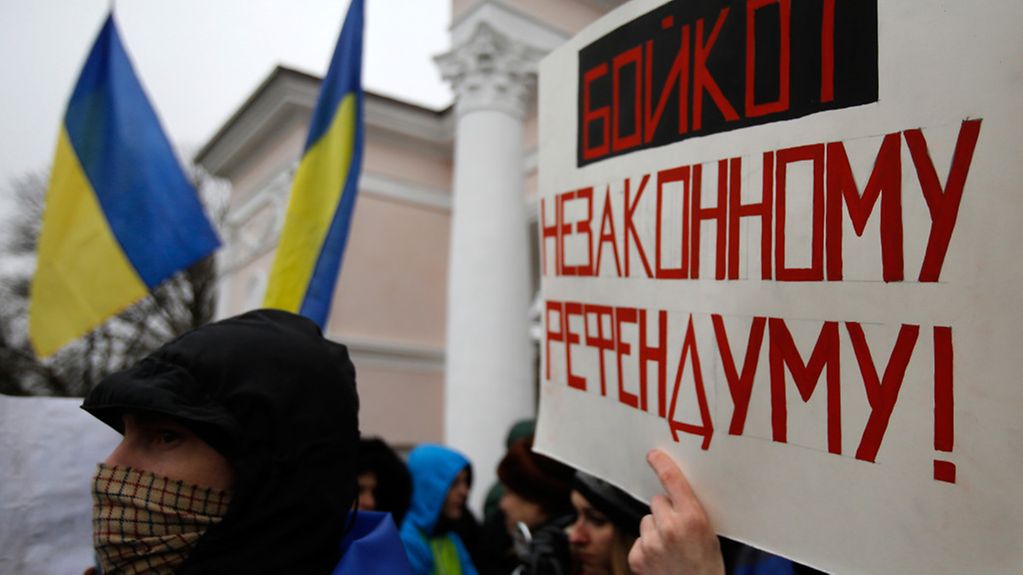Crimean crisis
Government spokesperson Steffen Seibert has termed the referendum on the secession of Crimea from Ukraine illegal. The referendum contravenes the Ukrainian constitution and international law, he said. Steffen Seibert called for a decision on the deployment of OSCE observers, a clear EU response, and specific support for Ukraine.
4 min reading time

Calls for a boycot of the illegal referendum relatively limited
Photo: picture alliance / AP Photo
Speaking at the government press conference in Berlin, Steffen Seibert said that the government is still seriously concerned. "The unchecked efforts to violate the sovereignty and territorial integrity of Ukraine, and to destabilise the country persist." During a phase of major uncertainty in Ukraine, Russia has proved itself not to be a partner interested in stabilising the situation. Indeed it is attempting to exploit the weaknesses of its neighbour.
Germany will not recognise the result
"This referendum violates the Ukrainian constitution and is a breach of international law," said Steffen Seibert. "It is illegal in our view." Germany condemns this unlawful referendum. "Not only do we and our European partners contest the legitimacy of the referendum; we will not recognise the results," he continued. The way the referendum was held quite clearly contravenes the most elementary requirements of any fair and free vote.
Voting under military presence
The phrasing of the questions put in the referendum were one-sided, criticised Steffen Seibert. Voters had no way of voting for the status quo. Voting took place against the backdrop of a crushing military and paramilitary presence – including the illegal presence of Russian troops. "Serious restrictions must be noted in the freedom of opinion and freedom of the press. The time lapse between the announcement of the referendum and voting was exceptionally short." And even this period was subsequently shortened twice.
Russia stands largely alone
The attitude of the German government with respect to the situation in Crimea is shared by many democratic forces: it corresponds largely to a draft report of the Council of Europe’s Venice Commission, said Steffen Seibert. And it mirrors the assessment of OSCE Chairperson-in-Office, Didier Burkhalter, as announced last week.
Russia stands largely alone in recognising the outcome of this so-called referendum. In the United Nations Security Council, a resolution condemning the unconstitutional and illegal nature of this referendum was approved by 13 nations. China abstained, and Russia used its veto.
Angela Merkel speaks by phone with Vladimir Putin
On Sunday Chancellor Angela Merkel once again communicated this clear position in a telephone conversation with Russian President Vladimir Putin. She also condemned the incident in Kherson, reported the government spokesperson, in which Russian troops seized a gas plant. This is one example of a measure to further destabilise the situation, said Steffen Seibert. "Measures like this have resulted in a worsening of the situation in southern and eastern Ukraine."
To sum up, Steffen Seibert once again laid out the goal of the German government. "The German government and our European partners would like to see things settle down in Ukraine. We hope that Ukrainian citizens, from whatever ethnic background, and whatever cultural affiliation, will be able to live safely and securely in a system and social order governed by the rule of law."
Call for three consequences
For the German government, the events of the last few days must have three consequences: the secondment of OSCE observers, an EU response including targeted sanctions and the call for specific support for Ukraine, reported Steffen Seibert.
- OSCE observers in Ukraine
Steffen Seibert urged that an OSCE observer mission begin work as soon as possible to prevent any escalation of the situation in the south and east of Ukraine. This was also discussed during the Chancellor’s telephone call with the Russian President. She called emphatically once again for a political solution.
"We would like to see a decision today on an OSCE observer mission. We hope that there will be broad support for the proposal," said Steffen Seibert. President Vladimir Putin responded positively to this initiative in his conversation with the Chancellor. "We hope that this will be reflected in Russia’s actions."
- EU response
"The lack of progress on a political process and the holding of this referendum call for a clear response on the part of the European Union," said Steffen Seibert. Until last Friday, the German government, the EU and the USA endeavoured to put in place a contact group. Regrettably the Russian government was not willing to do so. At today’s meeting of EU foreign ministers the first targeted sanctions will be imposed.
A question mark also hangs over the next EU-Russia summit. "If Russia continues along the path of annexing Crimea, further steps will have to be considered," said Steffen Seibert. The European Council, which is due to meet on Thursday and Friday this week, will be the next opportunity to evaluate further developments.
- Support for Ukraine
Steffen Seibert also called for support for Ukraine. "This assistance must not be delayed further. The people of Ukraine must be able to grasp tangible support," he declared. The appeal to the IMF and the EU is to achieve swift results having appraised the situation.
"The German government will not let up in its diplomatic efforts to de-escalate the crisis and to ensure that the sovereignty of Ukraine is respected," said Steffen Seibert to wind up. "Russia must end its military activities in Ukraine to the extent that they have not been agreed with Kyiv and are not in line with the agreements signed with the government in Kyiv. Any speculation about interventions in other parts of Ukraine are unacceptable and extremely dangerous."